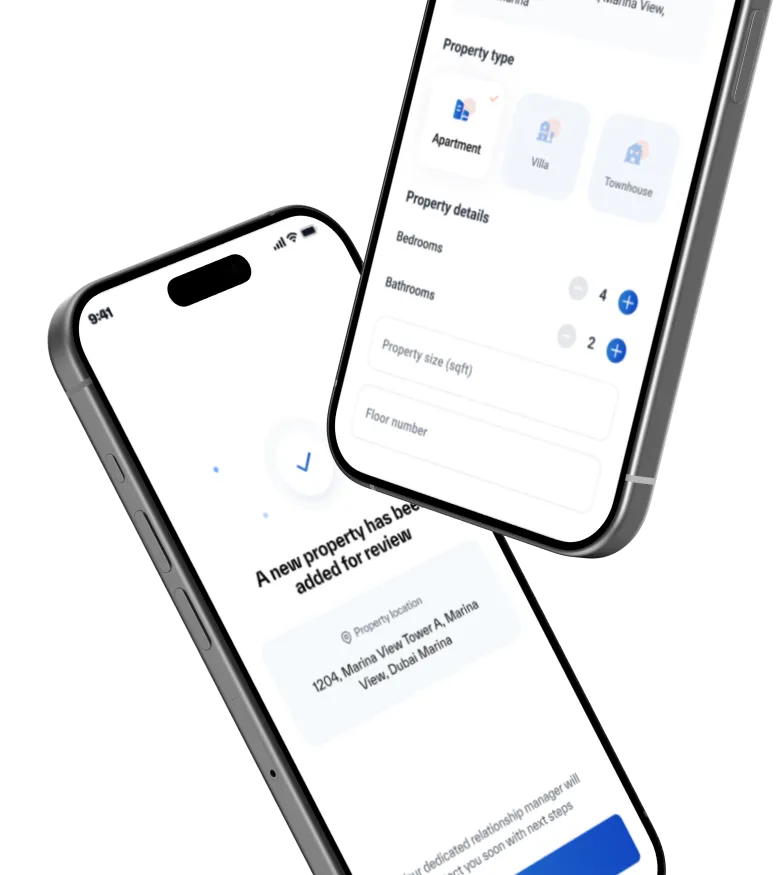Understanding tenant screening: your first line of defense
What is tenant screening?
Tenant screening is the process of verifying a prospective renter’s identity, financial stability, and rental history before signing a lease. This tenant screening process helps landlords avoid risks like missed payments, evictions, or property damage.
It’s a smart shift from relying on “gut feeling” to making data-backed rental decisions. When done right, tenant screening becomes a landlord’s most reliable filter against future issues.
Key information landlords must verify
A comprehensive tenant background check isn’t just a casual chat; it involves checking for red flags in a renter’s past behavior.
- Rental History: This highlights previous addresses and any patterns of late payment or early lease breaks.
- Employment & Income Verification: Confirming they have a stable job and can afford the rent is non-negotiable.
- Identity & Legal Status: Verifying passports, Emirates ID, and visa validity is crucial in the UAE.
This step ensures you’re leasing to someone who meets your baseline financial and legal standards.
What is a tenant screening report?
A tenant screening report is the final, consolidated document that summarizes all findings into an easy-to-read format, empowering you to make a quick, informed decision.
It’s essentially a comprehensive background check conducted by landlords to evaluate potential renters. Used properly, it can protect landlords from bad lease agreements. Extended eviction procedures often result in long vacancies, leading to rental loss and marketing expenses.
A short real-life example: a landlord once rented to someone who seemed professional but stopped paying by month two. A tenant screening report would have flagged their two prior evictions and unpaid bills saving the landlord from financial loss.
How to screen potential tenants
Step 1: Collect a complete rental application
Start with a digital rental application via the Keyper platform. A thorough rental application reveals important basics: income, employment, rental history, and references.
- Request personal ID (Emirates ID or passport copy)
- Ask for recent salary slips or bank statements
- Include employer contact details and current landlord reference
This is your tenant’s first impression. A well-structured application process, made simple with tenant screening software, already filters out unserious candidates.
.jpg)
Step 2: Verify income and employment
Check employment status through an NOC (No Objection Certificate) or job contract. Confirm monthly salary (ideally 3x the rent amount). Call the employer for verification if needed.
You need to be sure the tenant can reliably pay rent each month.
Tip: Keyper’s tenant credit screening tool makes this step easier by organizing all uploaded documents in one place.
Step 3: Review rental history
Ask for the last landlord’s contact details to validate how the tenant handled previous leases. Questions should focus on rent punctuality, property care, and whether the lease ended under agreeable terms.
Flagging signs of eviction, early termination, or ongoing disputes is critical. These issues often point to patterns that can surface again, costing you in legal fees, lost rent, or property damage.
A thorough tenant background check isn’t complete without this step even if the applicant seems professional. Reliable tenants usually leave behind a consistent rental track record you can validate in minutes.
Step 4: Run an Ejari history check
Dubai’s Ejari system keeps an official record of all registered tenancy contracts. Use the REST app or check with RERA to verify the tenant’s current and past leases.
Look out for red flags like overlapping contracts (which may indicate subletting or illegal rental activity) or repeated changes of address. These patterns often suggest housing instability or disputes.
Also, confirm there are no unresolved rental conflicts. An Ejari history check is one of the most overlooked yet powerful tenant screening services for landlords, helping you verify lease legitimacy with government-backed data.
Step 5: Conduct a credit check
While not legally required in Dubai, many landlords ask for a credit score to assess financial reliability. A report from the Al Etihad Credit Bureau (AECB) can highlight unpaid debts or bounced cheques.
Some tenants may have thin credit files or inconsistent income. In such cases, clearly explain why the request is being made and ensure it respects their privacy.
It’s worth noting that you may still come across good tenants with cash flow gaps. That’s where flexibility matters. You can point them toward options like Keyper’s RNPL (Rent Now, Pay Later) program:
By including tenant credit screening and a tenant credit check in your evaluation process, you reduce surprises while maintaining a responsible, transparent approach to risk.
Step 6: Set up a personal interview or video call
This step isn’t about grilling your applicant, it’s about making sure you understand their lifestyle, goals, and expectations.
Ask why they’re moving, when they plan to relocate, and what they’re looking for in a property. Share your house rules (e.g., guest policy, noise levels, rent payment terms) and observe how the tenant responds.
Look out for red flags like vague timelines, dodged questions, or unclear employment details. These subtle cues can indicate future issues.
This is your chance to gauge communication, attitude, reliability, and qualities which no form or report can reveal. A quick 10-minute call is often the final filter between smooth tenancies and chaotic ones.
The unique rental landscape of Dubai: Why standard screening isn’t enough
Tenant volatility and screening challenges in a global city
In a city as globally dynamic as Dubai, tenant screening can’t follow a one-size-fits-all model. The transient nature of the workforce, plus cultural and legal complexity, adds unique challenges for landlords.
High tenant turnover is the norm, especially in neighborhoods popular with expats. Lease terms are short, and many applicants don’t have long-standing UAE credit histories. Verifying international references becomes harder and language barriers during lease negotiations increase the risk of miscommunication.
Dubai’s housing market also sees greater financial fluctuation. Sudden job losses or canceled work permits can turn a reliable renter into a defaulting tenant overnight. These are structural realities that can’t be ignored.
Ultimately, tenant screening in Dubai requires a more specialized approach, one that blends localized verification with smart automation. Tools like Keyper streamline this by bringing together ID checks, salary proof, and tenancy validation under one system, tailored for the UAE market.
Understanding legal pitfalls: RERA regulations and landlord liabilities
Dubai’s real estate laws are clearly defined under RERA, but a single misstep — like an unverified visa or incorrect lease term — can expose you to legal action. Tenants can escalate unresolved issues to the Rental Dispute Center (RDC), and cases often lean in favor of the tenant if the landlord appears careless.
Make sure your screening process includes legal compliance: Emirates ID, valid visa, employment documentation, and properly signed tenancy contracts.
A documented screening process acts as your legal armor, proving you've done your due diligence.
Want to understand tenancy contract law in more detail? Read our full breakdown.
Financial red flags: Cheque bouncing and income instability
One of the most telling signs of financial distress is a bounced cheque. Despite new regulations, it remains a significant indicator of risk. Ask if the tenant has ever had a cheque returned due to insufficient funds and verify it when possible.
Job market volatility is another challenge. A tenant may present strong credentials today but lose their employment tomorrow. That’s why verifying salary with documentation and employer calls is non-negotiable.
If your screening process doesn’t account for this risk, you’re flying blind. Income instability leads to missed rent, legal complications, and longer vacancy periods. Prevent this with a careful combination of document review, digital screening tools, and personal interviews.
.jpg)
Common problems when you don’t screen properly
Disrupted cash flow: Late or missed rent payments
Even a single missed rent payment can hurt your ability to manage service charges, property maintenance, or mortgage commitments. Many landlords who skip tenant background check steps later face repeated delays in rent collection.
Using a reliable tenant screening software helps flag high-risk applicants before they cause damage. A strong tenant credit check also reveals late payment patterns, bounced cheques, or erratic income, giving you a clearer view of financial reliability.
Without proper screening, landlords end up chasing rent, spending time on legal notices, or dealing with drawn-out disputes.
Expensive repairs: Property damage beyond wear and tear
Tenants who don’t care for a property often leave behind broken appliances, damaged walls, or plumbing issues that go beyond the standard wear and tear covered by the security deposit.
Without tenant screening services for landlords, it’s hard to detect renters with a pattern of neglect. This is where tenant screening in Dubai becomes especially critical, given the fast tenant turnover rate and growing volume of furnished rentals.
A proper tenant background check can uncover past disputes, evictions, or damage reports before your lease is signed. This protects your investment and helps avoid surprises during property handover.
Unauthorized subletting and overcrowding risks
Illegal subletting leads to overcrowding, unregistered roommates, and increased utility strain. These situations not only damage your property but also breach rental laws and agreements.
Many of these issues come from tenants bringing in people who were never screened. Learning how to screen potential tenants properly helps avoid risks tied to unverifiable individuals.
Modern tenant screening software allows landlords to keep track of who’s actually living on-site. This ensures transparency and limits safety, insurance, or compliance risks tied to unknown occupants.
Legal disputes and the cost of eviction
Evictions in Dubai are long, expensive, and emotionally draining, especially under RERA regulations. One mistake in screening can turn into months of paperwork, court procedures, and lost income.
A proper tenant credit screening process provides documented proof that you vetted the tenant thoroughly. This gives you leverage in case of disputes or Rental Dispute Center hearings.
Poor tenant screening doesn’t just lead to payment issues. It can open the door to full-blown litigation, where lack of documentation or due diligence can work against you.For eviction insights, visit this link
How Keyper simplifies tenant screening
Purpose-built for the UAE market
This isn’t a generic platform. Keyper was built specifically for the UAE, understanding its real estate nuances, fast-paced mobility, and tenant diversity.
Rather than forcing landlords to adapt to global systems, Keyper adapts to Dubai. It follows local lease formats, integrates Emirates ID, and handles documentation in Arabic or English.
This level of customization is why tenant screening in Dubai increasingly depends on tools built for local law, not imported templates.
.jpg)
Specialized verification for local documents
In the UAE, Emirates ID and visa checks are legal necessities, not nice-to-haves. Verifying them manually can be error-prone and time-consuming.
Keyper automates this validation process, reducing identity fraud and ensuring tenants are eligible to sign leases. This layer of automation also improves application speed and confidence for both landlords and renters.
Using smart tenant screening software, you can instantly flag expired IDs or mismatched names before a lease becomes a legal liability.
Seamless communication in a multicultural city
Dubai’s rental market includes tenants from every continent. This brings communication challenges, especially around legal language, contract terms, or cultural norms.
Keyper supports multilingual interactions, especially English and Arabic. That way, both parties understand responsibilities, payment terms, and consequences clearly.
It’s a small feature that makes a big difference. By improving understanding, it reduces disputes and helps you attract more professional, informed tenants.
An all-in-one command center for your property
Tenant screening is only the beginning. With Keyper, once a tenant passes screening, their profile moves directly into your rent collection, lease generation, and maintenance dashboard.
This unified ecosystem saves time, eliminates double work, and lets you stay focused on the big picture.
From the first screening to the last maintenance request, you gain control, clarity, and continuity. It’s how serious landlords manage modern properties.
Full transparency with real-time application tracking
Too many landlords are left guessing where things stand. Keyper’s real-time tracking allows both landlord and tenant to see every application stage in one place.
No more calls asking whether documents have been checked. Tenants stay informed, and landlords can step in when required without micromanaging.
This transparency builds trust and prevents friction when time is critical. It’s the kind of visibility professional landlords should expect from any tenant screening services for landlords.
Frequently asked questions
When should you start using screening software?
If you're still relying on WhatsApp messages or spreadsheets to manage tenants, it’s likely time to consider a smarter approach. Keyper’s tenant screening software is designed for landlords who want to save time, reduce tenant turnover, and gain more stability across their rental properties.
Whether you manage multiple units, live abroad, or have experienced issues with unreliable renters in the past, screening software can simplify the entire process. It brings structure, documentation, and speed to an otherwise inconsistent system. First-time investors in Dubai’s property market especially benefit from having a streamlined way to filter applicants.
The key is moving from reactive fixes to proactive safeguards. With automated tools, you’ll prevent problems before they begin, rather than clean up afterward.
For more support, explore our guide to top-rated property management companies
What makes Keyper different from manual checks?
Manual screening processes often rely on memory, incomplete documents, or informal communications. They can be subjective, inconsistent, and hard to defend in legal disputes. Keyper replaces these pain points with tools designed to ensure accuracy and accountability.
Using tenant screening software, landlords can verify identification and visa status in real time. Employment and credit data are included when available, and all interactions are digitally stored for transparency. The system ensures that every applicant goes through the same structured review, eliminating the guesswork and reducing human error.
In short, it’s a move from scattered inputs to reliable data, all collected in a legally compliant way.Yes, and it’s actually one of the most valued features of the platform. Keyper is cloud-based, meaning that even landlords based overseas can manage their entire Dubai property portfolio from a browser.You don’t need to be physically present to verify documents, approve applications, or sign leases. Everything is organized in one secure interface, giving international property owners a professional edge while staying compliant with UAE regulations.Whether you’re based in Europe, North America, or Asia, Keyper makes cross-border property management seamless.
Can I use Keyper if I live outside the UAE?
Yes, and it’s actually one of the most valued features of the platform. Keyper is cloud-based, meaning that even landlords based overseas can manage their entire Dubai property portfolio from a browser.
You don’t need to be physically present to verify documents, approve applications, or sign leases. Everything is organized in one secure interface, giving international property owners a professional edge while staying compliant with UAE regulations.
Whether you’re based in Europe, North America, or Asia, Keyper makes cross-border property management seamless.
What if my tenant doesn’t have a UAE credit history?
A missing local credit history is not the end of the road. Many renters in Dubai are expats who are new to the region. Keyper handles this common scenario by checking alternative indicators such as Emirates ID, job contracts, employment verification, and submitted bank documents.
These tenant background checks offer a strong view of financial stability even without a formal credit file. Custom screening rules make it easier to assess each tenant’s potential based on facts that matter.
By adapting to Dubai’s demographic reality, Keyper ensures that landlords can make sound decisions without excluding reliable tenants for lack of local data.
What happens after I approve a tenant?
Once a tenant is approved, their profile flows into the rest of Keyper’s system. This includes rent invoicing, contract generation, and maintenance coordination, all from one dashboard.
There’s no need to re-enter the same information across tools. Lease agreements, payment tracking, and reminders are managed in the same interface that hosted the initial screening.
By consolidating every step into one workflow, Keyper cuts admin time and reduces the chance of missing important legal or financial steps.
You can explore the full property management system here
Don’t rent blind in Dubai’s competitive market
Dubai’s rental market moves quickly, and landlords need to stay ahead. A poor screening process can lead to long-term losses that no security deposit can cover. Manual checks are no longer enough in a high-turnover environment.
Proper tenant background checks, ID verification, and tenant credit checks give you a much clearer view of the people applying to live in your properties. When supported by professional tenant screening software, this process becomes consistent, accurate, and compliant with local laws.
It’s not just about avoiding bad tenants. It’s about creating a rental business that runs efficiently, with minimal risk and maximum legal protection.
For more insights, read the full tenant management guide












.webp)


